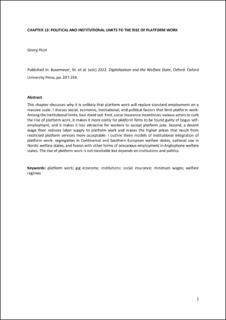Political and institutional limits to the rise of platform work
Chapter
Accepted version
Permanent lenke
https://hdl.handle.net/11250/3040185Utgivelsesdato
2022Metadata
Vis full innførselSamlinger
Originalversjon
In: Busemeyer, M. et al. (eds) 2022, Digitalization and the Welfare State, Oxford: Oxford University Press, pp. 237-254Sammendrag
This chapter discusses why it is unlikely that platform work will replace standard employment on a massive scale. I discuss social, economic, institutional, and political factors that limit platform work. Among the institutional limits, two stand out. First, social insurance incentivizes various actors to curb the rise of platform work, it makes it more costly for platform firms to be found guilty of bogus selfemployment, and it makes it less attractive for workers to accept platform jobs. Second, a decent wage floor reduces labor supply to platform work and makes the higher prices that result from restricted platform services more acceptable. I outline three models of institutional integration of platform work: segregation in Continental and Southern European welfare states, optional use in Nordic welfare states, and fusion with other forms of precarious employment in Anglophone welfare states. The rise of platform work is not inevitable but depends on institutions and politics.
